2017年高一英语人教版必修3教案:Unit4Revision:SummingUpandLearningTip+Word版含解析
高一必修3unit4教案.docx
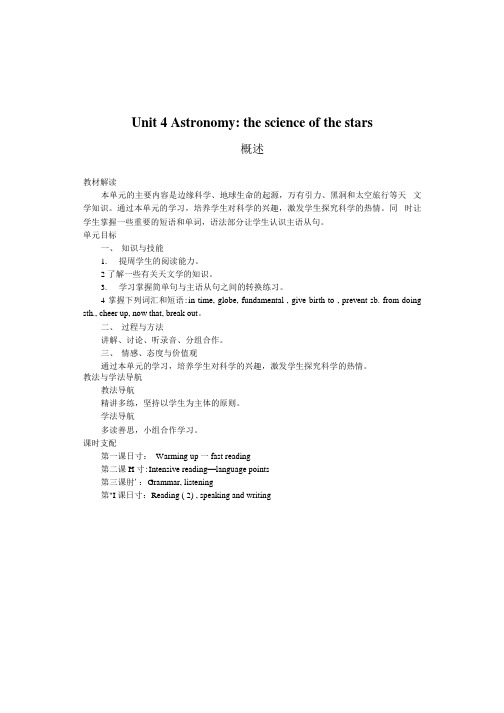
Unit 4 Astronomy: the science of the stars概述教材解读本单元的主要内容是边缘科学、地球生命的起源,万有引力、黑洞和太空旅行等天文学知识。
通过本单元的学习,培养学生对科学的兴趣,激发学生探究科学的热情。
同时让学生掌握一些重要的短语和单词,语法部分让学生认识主语从句。
单元目标一、知识与技能1.提周学生的阅读能力。
2 了解一些有关天文学的知识。
3.学习掌握简单句与主语从句之间的转换练习。
4 掌握下列词汇和短语:in time, globe, fundamental , give birth to , prevent sb. from doing sth., cheer up, now that, break out。
二、过程与方法讲解、讨论、听录音、分组合作。
三、情感、态度与价值观通过本单元的学习,培养学生对科学的兴趣,激发学生探究科学的热情。
教法与学法导航教法导航精讲多练,坚持以学生为主体的原则。
学法导航多读善思,小组合作学习。
课时支配第一课日寸:Warming up一fast reading第二课H寸:Intensive reading—language points第三课肘':Grammar, listening第"I课日寸:Reading ( 2) , speaking and writing第1课时教案I Warming up and Reading教学目标一、知识与技能1.培养阅读理解能力。
2.了解生命的起源。
3.掌握重点词汇和短语:religion, theory, violent, atmosphere, unlike, fundamental, oxygen, exist, thus, in time, lay eggs, give birth to, in one's turn, pre vent...from..., depend on。
人教新课标高一英语必修三教案:Unit4Astronomy全单元.docx
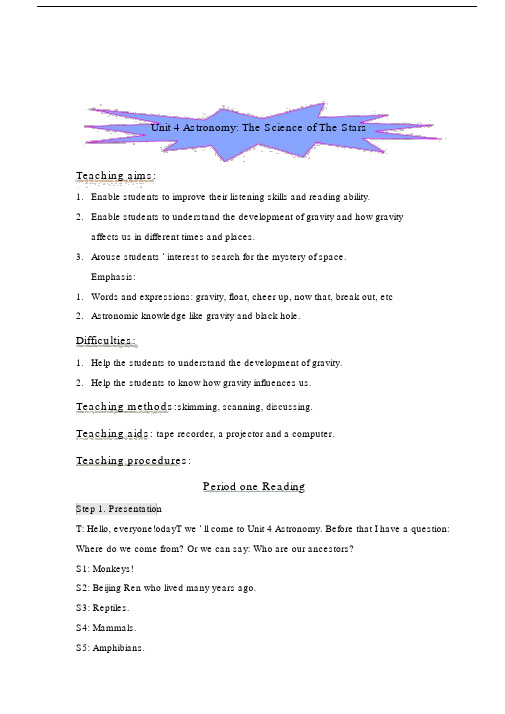
Unit 4 Astronomy: The Science of The StarsTeaching aims:1.Enable students to improve their listening skills and reading ability.2.Enable students to understand the development of gravity and how gravityaffects us in different times and places.3.Arouse students ’ interest to search for the mystery of space.Emphasis:1.Words and expressions: gravity, float, cheer up, now that, break out, etc2.Astronomic knowledge like gravity and black hole.Difficulties:1.Help the students to understand the development of gravity.2.Help the students to know how gravity influences us.Teaching methods:skimming, scanning, discussing.Teaching aids: tape recorder, a projector and a computer.Teaching procedures:Period one ReadingStep 1. PresentationT:Hello, everyone!odayT we ’ ll come to Unit 4 Astronomy. Before that I have a question: Where do we come from? Or we can say: Who are our ancestors?S1: Monkeys!S2: Beijing Ren who lived many years ago.S3: Reptiles.S4: Mammals.S5: Amphibians.S6: Dinosaurs.T: Very good! Can you put them in right order?S7: Amphibians, Reptiles, Dinosaurs, Mammals, Beijing Ren.T:Do you know what it was like before life appeared on earth?S8: It was full of water, perhaps.T: Before that, what was it like?S9: Sorry, I don’ t know.T: Do you want to get more information? Today we’ ll learn something about How Life Began the Earth. Turn to Page 25. Let’ s come to Warming up first.Step 2. Warming up1.Read the three questions, while the students listen and follow.2.Give the Ss several minutes to discuss the questions.3.Collect answers from the whole class.4.Check the answers while discussing.T:I ’ ll read the three questions for you. You should listen to me carefully. (If students don howto discuss, show them an example.) For example, medicine. When someone gets seriousillness, he will go to the hospital. The doctor will examine him. He will take his temperature, measurehis blood pressureand give him an X-ray, or a CT. For the whole process of the examination, what kind of science has been used?S1: Biology.S2: Chemistry.T:So we can say medicinecombinesbiologyand chemistry.What aboutbiochemistryand geophysics?S3: I think biochemistry combines biology and chemistry.S4: Geophysics combines geology and physics.T:What about astronomy?S5: Physics.S6: Mathematics.T:Very good. We should know that astronomy is a multidisciplinary subject and if we want todo some researchon it, we shouldknow many sciencesubjectsrelatedto it. Now discussthesecond question:Whatdo we mean when we say we are studying a subject scientifically? Or what’ s t attitude towards science?S7: We should be objective, not superstitious.T: What ’ s the correct way to prove a scientific idea?S8: We should design experiments to test it for several times.S9: Then we can analyze the results and draw a conclusion at last.T:Let ’ s sum up the answers. To study a subject scientifically, we must try to be objective. Inorder to test our idea, we shoulddesign experiments,then analyzethe results and draw a conclusion. Now let’ s talk about the third question.What are the most important skills we need to be real scientists?S10: We should be very careful.S11: Be objective and logical.S12: We should be wise enough to design an experiment and write the reports clearly.S13: We should be able to draw conclusions from the experiments and not imposeconclusions on the data.T: I think you have done great work. From the discussion we know that it’ s not e scientist. So you should work harder if you want to be a scientist.Step 3. Pre-readingGet the Ss to discuss the questions on Page 25 with their partners. Then ask the Ss to tell their stories. Encourage the Ss to tell different stories. If they don’ t know any, tell th T:Nowplease look at the slide show. And discuss these questions with your partners. ThenI ask some students to tell us their stories. Are you clear?Ss: Yes, Sir/Madam.1. Do you know each religion or culture has its own ideas about the beginning of the universe? Please give an example if you know.2. Do you know what a scientific idea is?After the Ss ’ discussion, teacher says the following.T:Now who ’ d like to tell us a story? Volunteer!S1: Let me try. In China, we all know that Pangu separates the sky from the earth.T:Can you describe the story in details?S1: Sorry, I can’ t remember clearly.T:Who can? Nobody? Now I ’ ll tell you. Look at the screen.Step 4. ReadingScanningGet the Ss to read the passage quickly and accurately and meanwhile helpSs thetoform agood habit of reading.Teachergives the Ss a coupleof minutesto look throughthe wholepassage. Tell the Ss to read the text silently and then ask some detailed questions aboutthe text on the slide show with their partners. Teacher shouldencourage the Ss to expresstheir ideas.T: We ’ re going to learn a passage about how life began on the earth. Now let ’ s show. Read the text quickly and find answers to the following questions. Show the questions on the screen.1.What was there on the earth before life could begin?2.Why do scientists think there has never been life on the moon?3.Why did animals first appear in the seas?4.Why did green plants help life to develop?5.Why were mammals different from other animals?T: Now who can answer the first one?S1: Water vapour, carbon dioxide, oxygen, nitrogen and other gases.T: What about the second one?S2: Because there is no water on the moon.T: What about the third one?S3: Because water allowed the earth to dissolve harmful gases into the oceans and seas.T: The fourth one?S4: Becausegreenplants can takecarbondioxidefrom the atmosphereand fill the airwith oxygen.T: What about the last one?S5: They were different because they produced their young from within their bodies.T: Well done! Now turn to Page 26 Comprehending1, I think you may continue to read it againto get more details.SkimmingIn this part, Ss will read the text again and then finish Part1, 2 and 3.T:Now please skim the passage fast to finish Part1. Then we will check the answer.Key to Part1: BCBBT:Skim Paragraph 2, 3 and 4, and finish Part 2 and 3.Key: DBIGEHACFJT:For Part 3, discuss them with your partner.T:Why is it wrong in films and stories to show dinosaurs and people together?S:Because dinosaurs died out long before human beings developed on the earth.T:Do you agree with him?S:Yes.T:What about the answer to the second question?S:They are the cleverest animals because they have larger brains than any other creatures on the earth so far.T:Excellent job! I ’ ll check how much you have learned about the passage. Step 5. ListeningListen to the tape for the students to follow and have further understanding of the passage. T:Read after the tape, then answer me some questions with your book closed.Play the tapeT:How did water come into being on the earth?If one student can’ t answer completely, ask two or three or more students.Ss: The explosion of the earth produced water vapor, which turned into water when the earth cooled down.T:Why is water important on the earth?Ss: Because water allowed the earth to dissolve harmful gases into the oceans and seas. T:No.3, finish the following form.1 small plants in2water3 green plants on land4insects(on land)576 forests89Key to the exercise:2.shellfish and all sorts of fish5.amphibian(on land and in water)7.reptiles (on land) 8.dinosaurs(on land) 9.mammals(on land)T: That’ s all for this passage. Now let’ s deal with some language points. ExplanationT: Turn to Page 25. Let’ s look at the sentences:1.It exploded loudly with fire and rock, which were in time to produce the water vapour. which leads non-restrictive attributive clause.in time: sooner or later;eventually I ’ ll see him in time.in time (for sth. /to do sth.): not lateShe will be back in time to prepare dinner.in / out of time: in/not in the correct time Theaudience clapped in time to the music.2.Nobody knew that it was going to be different from other planets going around the sun. be different from: not like someone or something else in one or more waysNote: We can use very, much, quite, entirely, totally to modifydifferent City life is quite different from country life.going around the sun is-ing form that serves as attributive.Men breaking the law will be punished.Can you see the girl dancing with your boyfriend?3.Whether life will continue on the earth for millions of years to come will depend on whether this problem can be solved.to come: serves as attributiveShe is the last person to do such a thing.depend on: something might only happen or be true if the circumstances are right for it Our success depends on whether everyone works hard or not.4. Walking does need a bit of practice now that gravity has changed.now that: because of the fact thatNow that I’ m free, I can enjoy music for a while.Nowthat you’ ve grown up you can decide it yourself.Passage AnalyzingChart of the textHow life began on the earthwater 1 small plants in water2 shellfish and all sorts of fish4 insects (on land)4 insects(on land)5 amphibians (on land and in5 amphibians(on land and inwater)7 reptiles (on land)8 dinosaurs (on land)9 mammals (on land)Text RetellingRetell the text using about 100 words.Step 6. HomeworkRetell the passage according to the form.Remember important language points.3 green plants on land6forests10.small clever animalswith hands and feet11.humanPeriod two Extensive reading Step 1Show some pictures of the astronauts in the spaceStep 2Read the passage and fill in the formStep 3 Language pointsst month I was lucky enough to have a chance to make a trip into space with my friend Li Yanping, an astronomer.He couldn ’ t run quickly enough to catch up with the cat.2. Then we were off.be off = set offI am off today.We are off today.3get close to靠近,接近,指动态变化be close to距 ......近,指状态4.But when I tried to step forward I found I was carried twice as far as on the earth andfell over.1). “ A + be倍数+ + as +形容词原级 + as + B ” .This tree is three times as tall as that one.2).“ A + be倍数+ +形容词比较级+ than + B”The number of students in our school is three times larger than that in theirs.3).“ A + be倍数+ + the +名词(size, length, amount) + of + B”The newly broadened square is four times the size of the previous one.6.We watched, amazed as fire broke out on the outside of the spaceship as theearth increased.break out1)战争爆发2)发生争吵3)(火灾 )发生7.cheer up; cheer sb. up感到高兴振奋8.masses of 许多,大量9.get the hang of熟悉 ,掌握 ,理解10.exhausting (sth); exhausted (sb)Step 4 HomeworkCollect passages about gravity.Prepare for speaking.Period three Language Study Step 1. RevisionTranslate the following sentences1.你迟早会成功的。
人教版高中英语必修三教案:unit4+Grammar+practice.doc
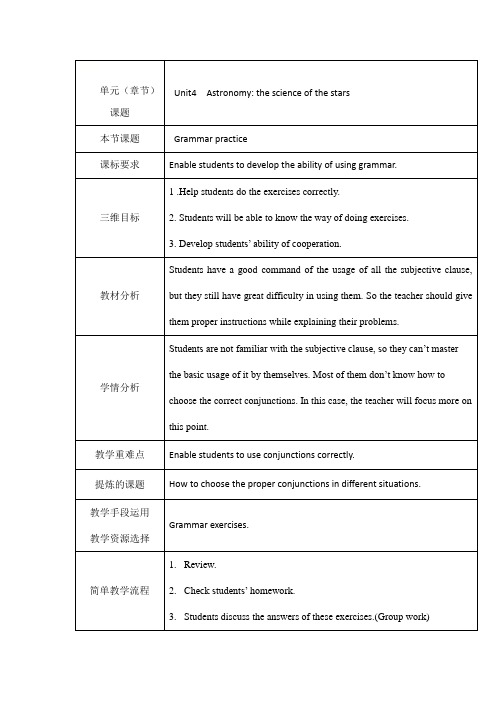
单元(章节)精美句子1、善思则能“从无字句处读书”。
读沙漠,读出了它坦荡豪放的胸怀;读太阳,读出了它普照万物的无私;读春雨,读出了它润物无声的柔情。
读大海,读出了它气势磅礴的豪情。
读石灰,读出了它粉身碎骨不变色的清白。
2、幸福幸福是“临行密密缝,意恐迟迟归”的牵挂;幸福是“春种一粒粟,秋收千颗子”的收获. 幸福是“采菊东篱下,悠然见南山”的闲适;幸福是“奇闻共欣赏,疑义相与析”的愉悦。
幸福是“随风潜入夜,润物细无声”的奉献;幸福是“夜来风雨声,花落知多少”的恬淡。
幸福是“零落成泥碾作尘,只有香如故”的圣洁。
幸福是“壮志饥餐胡虏肉,笑谈渴饮匈奴血”的豪壮。
幸福是“先天下之忧而忧,后天下之乐而乐”的胸怀。
幸福是“人生自古谁无死,留取丹心照汗青”的气节。
3、大自然的语言丰富多彩:从秋叶的飘零中,我们读出了季节的变换;从归雁的行列中,我读出了集体的力量;从冰雪的消融中,我们读出了春天的脚步;从穿石的滴水中,我们读出了坚持的可贵;从蜂蜜的浓香中,我们读出了勤劳的甜美。
4、成功与失败种子,如果害怕埋没,那它永远不能发芽。
鲜花,如果害怕凋谢,那它永远不能开放。
矿石,如果害怕焚烧(熔炉),那它永远不能成钢(炼成金子)。
蜡烛,如果害怕熄灭(燃烧),那它永远不能发光。
航船,如果害怕风浪,那它永远不能到达彼岸。
5、墙角的花,当你孤芳自赏时,天地便小了。
井底的蛙,当你自我欢唱时,视野便窄了。
笼中的鸟,当你安于供养时,自由便没了。
山中的石!当你背靠群峰时,意志就坚了。
水中的萍!当你随波逐流后,根基就没了。
空中的鸟!当你展翅蓝天中,宇宙就大了。
空中的雁!当你离开队伍时,危险就大了。
地下的煤!你燃烧自己后,贡献就大了6、朋友是什么?朋友是快乐日子里的一把吉它,尽情地为你弹奏生活的愉悦;朋友是忧伤日子里的一股春风,轻轻地为你拂去心中的愁云。
朋友是成功道路上的一位良师,热情的将你引向阳光的地带;朋友是失败苦闷中的一盏明灯,默默地为你驱赶心灵的阴霾。
2017年高一英语人教版必修3教案:Unit4Reading+Word版含解析
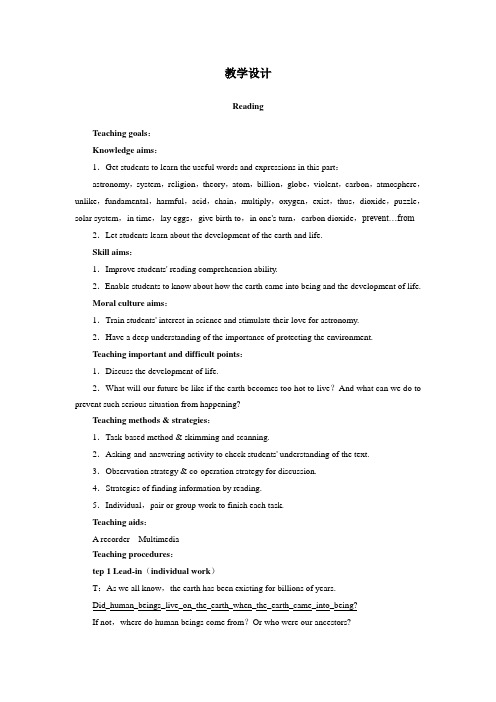
教学设计ReadingTeaching goals:Knowledge aims:1.Get students to learn the useful words and expressions in this part:astronomy,system,religion,theory,atom,billion,globe,violent,carbon,atmosphere,unlike,fundamental,harmful,acid,chain,multiply,oxygen,exist,thus,dioxide,puzzle,solar system,in time,lay eggs,give birth to,in one's turn,carbon dioxide,prevent…from 2.Let students learn about the development of the earth and life.Skill aims:1.Improve students' reading comprehension ability.2.Enable students to know about how the earth came into being and the development of life.Moral culture aims:1.Train students' interest in science and stimulate their love for astronomy.2.Have a deep understanding of the importance of protecting the environment.Teaching important and difficult points:1.Discuss the development of life.2.What will our future be like if the earth becomes too hot to live?And what can we do to prevent such serious situation from happening?Teaching methods & strategies:1.Task-based method & skimming and scanning.2.Asking-and-answering activity to check students' understanding of the text.3.Observation strategy & co-operation strategy for discussion.4.Strategies of finding information by reading.5.Individual,pair or group work to finish each task.Teaching aids:A recorder MultimediaTeaching procedures:tep 1 Lead-in(individual work)T:As we all know,the earth has been existing for billions of years.Did_human_beings_live_on_the_earth_when_the_earth_came_into_being?If not,where do human beings come from?Or who were our ancestors?S1:Monkeys!S2:Beijing Ren who lived many years ago.S3:Apes(类人猿).S4:Gorillas(大猩猩).S5:Chimpanzees(黑猩猩).T:Very good.They belong to primate(灵长目动物).Another question:Do you know what plays the most important part in our body?(Water or fat?)T:Water.Then do you know how did water come into being on the earth?Ss:No.Step 2 Fast reading(task 1)Read Paragraphs 1-3.After reading,let students watch the video of “Big Bang”,and then answer the question “How did water come into being on the earth?”(individual work)Possible answer:The explosion of the earth produced water vapour,which turned into water when the earth cooled down.Read the first three paragraphs again with the questions on the screen:1)What is the earth's atmosphere made up of?2)Why was the earth different from other planets?A.It produced a lot of heat.B.The water remained.C.Water disappeared. D.It was the oldest planet.3)Why was water very important for the beginning of life?When students meet some difficulty,the teacher can give them some hints.For example:What is the earth's atmosphere made up of?(Show students some pictures about the earth's atmosphere.)Do the exercises.(group work)Check the answers.Possible answers:1)Carbon,nitrogen,water vapour and other gases.2)B3)Water allowed the earth to dissolve harmful gases and acids into the oceans and seas.That made it possible for life to begin to develop.Step 3 Intensive reading(task 2)T:When water came into being on the earth,life began.Then do you know how the lifedeveloped?Read the whole text and finish the chart.(pair work)Development of LifeAsk two students to write their answers on the blackboard.Possible answers:1.dust2.globe3.atmosphere4.Water5.plants6.oxygen7.land8.amphibians 9.dinosaurs10.mammalsStep 4 Have a discussion(task 3)Through the writer's description,we learned the development of life.It's a long and slow process.And the earth is the best place for all the living things to live on.But human beings didn't take good care of it.Listen to the last paragraph twice with books closed.Choose the best answers.(individual work)1)What problem is caused by human beings?A.They exist everywhere on the earth.B.They cause global warming.C.They find new methods of growing crops.D.They enjoy hunting and fishing.2)From the last paragraph we can infer that the author is a little ______.A.happy B.careless C.worried D.excitedPossible answers:1)B2)CNow we learn that human beings cause global warming.That is the green house effect.If the earth may become too hot for the lives on it,what will our future be like?And what can we do to protect our earth?Please have a discussion according to the questions.(group work)Questions:1)What will our future be like if the earth becomes too hot to live?2)What can we do to protect our earth?Notes:The green house effect is the main cause of the melt of iceberg,drought,floods and insect pest.Everyone on the earth must take action to protect our earth.For example,we can plant many trees.We must do our best to stop polluting our environment.Many new laws should be passed to place strict control over industrial pollution.Educate people in fighting pollution.Ask some groups to present their opinions.Step 5 Self-assessmentWrite down your opinions according to the questions in the card.1)Can you give a brief introduction to how the universe developed,how life began on the earth and the development of life in your own words?2)What strategies of reading have you learned in the class?3)Are you active in the class?4)What problems did you have in reading?5)What help do you need from the teacher?Step 6 Homework1)Please try your best to retell the passage in your own words.2)Write a short passage according to what we have discussed.The title is “How to Protect the Earth”.About 120 words.。
英语 人教必修版 第三册教案 Unit4
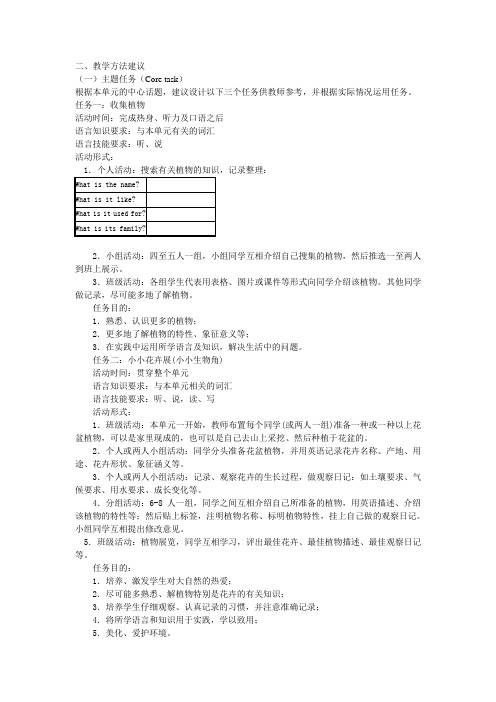
二、教学方法建议(一)主题任务(Core task)根据本单元的中心话题,建议设计以下三个任务供教师参考,并根据实际情况运用任务。
任务一:收集植物活动时间:完成热身、听力及口语之后语言知识要求:与本单元有关的词汇语言技能要求:听、说活动形式:1.个人活动:搜索有关植物的知识,记录整理:2.小组活动:四至五人一组,小组同学互相介绍自己搜集的植物,然后推选一至两人到班上展示。
3.班级活动:各组学生代表用表格、图片或课件等形式向同学介绍该植物。
其他同学做记录,尽可能多地了解植物。
任务目的:1.熟悉、认识更多的植物;2.更多地了解植物的特性、象征意义等;3.在实践中运用所学语言及知识,解决生活中的问题。
任务二:小小花卉展(小小生物角)活动时间:贯穿整个单元语言知识要求:与本单元相关的词汇语言技能要求:听、说,读、写活动形式:1.班级活动:本单元一开始,教师布置每个同学(或两人一组)准备一种或一种以上花盆植物,可以是家里现成的,也可以是自己去山上采挖、然后种植于花盆的。
2.个人或两人小组活动:同学分头准备花盆植物,并用英语记录花卉名称、产地、用途、花卉形状、象征涵义等。
3.个人或两人小组活动:记录、观察花卉的生长过程,做观察日记:如土壤要求、气候要求、用水要求、成长变化等。
4.分组活动:6-8人一组,同学之间互相介绍自己所准备的植物,用英语描述、介绍该植物的特性等;然后贴上标签,注明植物名称、标明植物特性,挂上自己做的观察日记。
小组同学互相提出修改意见。
5.班级活动:植物展览,同学互相学习,评出最佳花卉、最佳植物描述、最佳观察日记等。
任务目的:1.培养、激发学生对大自然的热爱;2.尽可能多熟悉、解植物特别是花卉的有关知识;3.培养学生仔细观察、认真记录的习惯,并注意准确记录;4.将所学语言和知识用于实践,学以致用;5.美化、爱护环境。
任务三:生物科学家论坛活动时间:学完“读前”、“阅读”、“读后”、“综合技能”之后语言知识要求:本单元有关词汇语言技能要求:读、写、说、听活动形式:1小组活动:以4-6人为一小组,讨论确定将要介绍的生物科学家。
必修3 Unit4教案 高一英语

Unit4 Astronomy: the science of the starsI单元教学目标技能目标GoalsTalk about the science of the stars, the development of life and space travel and gravityPractise giving instructionsPractise talking abut problems in study or lifeLearn to use Noun Clauses as the subjectLearn to write an essay to show your problems and the way to overcome them.II. 目标语言功能句式Talk about the science of the stars, the development of life and space travel and gravityWhere do we come from?How did the universe begin?Why is the universe the way it was?How will it end?How much do you know about universe?Do you want to have a space travel?Do you know something about gravity?Do you know something about black holes?Practise giving instructionsPlease look at/ listen to…Please check that…You need…Please pay attention to…Don’t forget to…You’d better…Make sure you…Watch out for…You mustn’t…Practice talking about problems in study or lifeMy problem is…The difficulty is…My trouble is…The question is…My advice is…What I think about it is…The fact is…My suggestion is…词汇1 四会词汇astronomy, atmosphere, system, violent, solid, explode, carbon, dioxide, oxygen, surface, planet, harmful, development, spread, method, depend, exist, presence, telescope, disappoint, disappointed, publish, publishing, gravity, force, gradually, cheer, float, mass2认读词汇astronomer, biochemistry, geophysics, solar, Big Bang, vapour, nitrogen, dissolve, amphibian, reptile, generally, mammal, global, comet, Issac Newton, Albert Einstein, Stephen Hawking, lessen,weightlessly, cabin, exhaust, exclaim3 词组solar system, in time, prevent…from, depend on, cheer up, now that, get the hang of, break out语法Noun Clauses as the subjectNoun Clauses as the subject is also called the Subject Clause. That means a Noun Clause serves as Subject in the sentence. The words which are used in this Noun Clause are: that, whether, who, what, which, when, where, how, why, etc..Example1. What it was to become was a mystery.2. It was not clear whether the solid shape was to last or not.重点句子1. What it was to become was a mystery until the dust began to slowly combine into a ball moving around the sun. P252. It’s exploded loudly with fire and rock, which were in time to produce the water vapour, carbon dioxide, oxyge n, nitrogen and other gases, which were to make the earth’s atmosphere. P253. It allowed the earth to dissolve harmful gases, which had become part of the earth’s atmosphere, into the oceans and seas. P254. Whether life will continue on the earth for millions of years to come will depend on whether this problem can be solved. P265. When we get closer to the moon, we shall feel its gravity pulling us but it will not be as strong a pull as the earth’s. P306. Walking does need a bit of practice now that gravity has changed. P317. We watched, amazed as fire broke out on the outside of the spaceship the earth’s gravity increased. P318. Seen from space, the earth appears to be a water ball.9. But the answers have always seemed well beyond our reach, until now.10. Huge questions remain to be answered, before we can hope to have a complete picture of the universe we live in.III.教材分析和教材重组:1.教材分析:本单元以astronomy: the science of the stars, the development of life, space travel and gravity 为话题,通过本单元的几篇阅读材料使学生对以上问题有所了解,并通过文章中的一些探讨性的问题,比如,The earth may become too hot for the lives on it. Then what will our future be? 使学生更好地了解我们的地球和我们的生活环境,并引发对“地球的将来如何”的热烈讨论,通过这些讨论会激发学生对天文学了解和探究的强烈兴趣。
必修三Unit 4(4) 教案 人教版高中英语
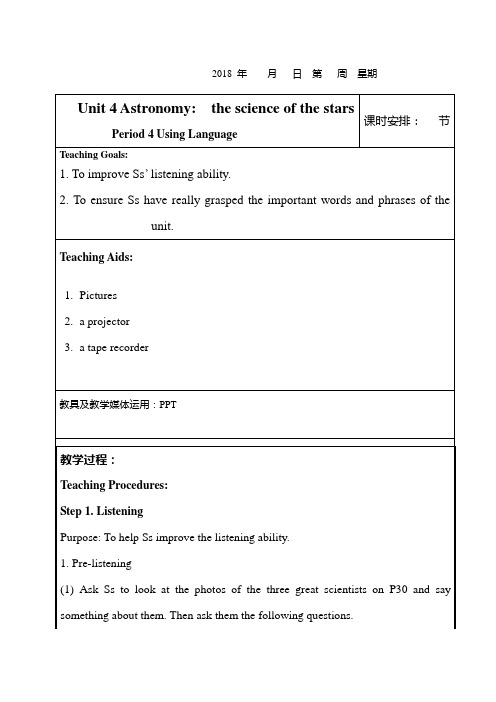
2018 年月日第周星期①Do you know about some background knowledge of these three great scientists ?②Can you say something about them?(2) Ask Ss to look through Ex1 and Ex2 on P30 and get fully prepared for listening to the tape.2. Listening(1) Ask Ss to listen to the tape and finish Ex1 on P30.(2) Play the tape again and ask Ss to check the answers in pairs.(3) Ask Ss to listen to the tape for the third time and finish Ex2 on P30. Then have some of them explain their answers.Step 2. ReadingPurpose : To get Ss to know about human being’s feelings of visiting the moon. 1. Fast readingAsk Ss to look through the text quickly and choose the best answer to the following question.The passage is mainly about ____?A. introduction of the moonB. the gravity that I felt on my way to the moonC. my visit to the moonD. my friend Yanping, an astronomer Suggested Answer: C.2. Intensive readingAsk Ss to read the text carefully and finish the following exercises.(1) According to the text, we know that the force of the gravity would change_____ times.A. 2B. 3C. 4D. 5(2) When did the author feel strongest of the gravity of the earth?A. On the moon.B. On the half way to the moon.C. At the very beginningD. On their leaving from the moon(3) What causes the writer to feel that he becomes weightless on the moon?A. SpaceshipB. GravityC. His friendD. His Good feelings of the moon(4) From the text we can know if a man grows up on the moon, _____.A. he will grow taller than on the earthB. he will grow shorter than on the earthC. he will become fatterD. he will become weightless Suggested Answers: (1) B (2) C (3) B (4) AStep 3. Speaking and writingPurpose: To get Ss to learn how to prepare a list of things used for going to the moon.To practice the writing ability of Ss.1. Divide the whole class into 6 groups. Let Ss discuss with their group members what they might need to go to the moon. Meanwhile, ask one student of each group to write down the important parts of their discussion.2. After the discussion Ss have had some knowledge of the things they would need if they were going to the moon. Get them to describe the three ways in which gravity changed for Li Yanping and how his weight changed..3. Then Ss to write a short passage explaining three problems they might meet on the moon as well as the solutions to these difficulties. Before writing, they can have a discussion.Step 4. Consolidation1. Ask Ss to finish Ex2 and Ex3 on P63~P64 and let them check the answers together.2. Ask Ss to finish the following exercises.(1) Fill in the blanks with proper words according to the given information.①The scientific study of the stars is called a______________.②Eating too much during the Spring Festival can do great h_______ to our health.③The patient’s health is g___________ improving with the help of the doctor.④The mixture of gases that surround the earth is called a_____________.⑤People can find lots of v___________ scenes in some American films.⑥Hearing the exciting story, almost everyone in the room _____________(爆发) with laughter.⑦The forest __________(延伸) as far as the river bank.⑧The wife was much ____________ (失望的) at her husband’s absence.⑨Marx was _________ (强迫) to leave his motherland for political reasons.⑩There is much dust __________ (漂浮) in the air.Suggested Answers: ①astronomy ②harm ③gradually ④atmosphere⑤violent ⑥exploded ⑦spreads ⑧disappointed ⑨forced ⑩floating(2) Finish the following sentences according to the Chinese.①______________________________________ (使我苦恼的) is that I haven't heard from him recently.②Do not read books in the poor light as it is _____________________ (对你的眼睛有害).③_____________________ (随着时间的推移), we are getting better with each other.④_____________________________________________ (我过去在工厂工作了十年) has a great and active effect on my life.⑤Please try to come back early _______________________________. (既然一切都安排好了)Suggested Answers:①What makes me upset / annoyed ②harmful to your eyes ③As time goes by ④That once I worked in a factory for ten years ⑤now that everything has been arranged(3) Choose the best answer to the following sentences.①The Americans are eating _____ vegetables today as they did before.A. more than twiceB. more than twice as manyC. twice over as manyD. over twice as much②If you always work so hard like this, you will ____ sooner or later..A. break upB. break out C break down D. break in③—Will you go out for shopping this Sunday?—Well, ___________.A. I would like to go.B. it all dependsC. I have a lot of work to doD. certainly not④Beyond _____ stars the astronaut saw nothing but _____ space.A. the; /B. /; theC. /; /D. the; the⑤_____ you have got a chance, you might as well make use of it.A. AfterB. AlthoughC. As soon asD. Now thatSuggested Answers: ①B ②C ③B ④A ⑤DStep 5. Homework1. Ask Ss to use the words and phrases learned in this unit to write a short passage about their own opinions on traveling to space.2. Ask Ss to preview the next period.课后反思:。
人教版英语必修三Unit 4(第一课时)教案
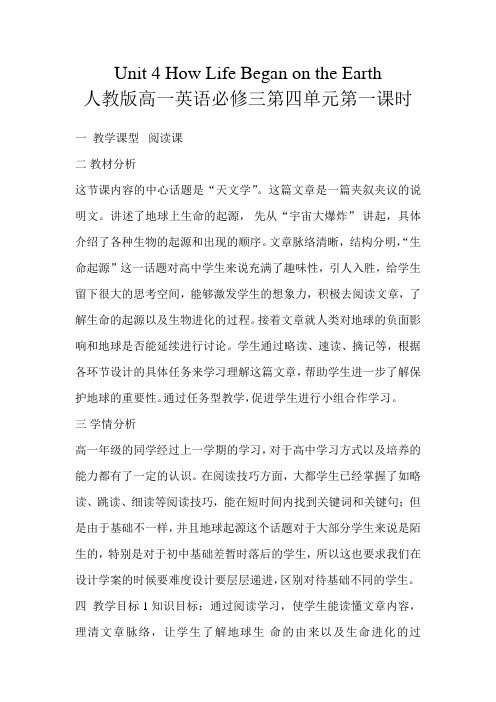
Unit 4 How Life Began on the Earth人教版高一英语必修三第四单元第一课时一教学课型阅读课二教材分析这节课内容的中心话题是“天文学”。
这篇文章是一篇夹叙夹议的说明文。
讲述了地球上生命的起源,先从“宇宙大爆炸”讲起,具体介绍了各种生物的起源和出现的顺序。
文章脉络清晰,结构分明,“生命起源”这一话题对高中学生来说充满了趣味性,引人入胜,给学生留下很大的思考空间,能够激发学生的想象力,积极去阅读文章,了解生命的起源以及生物进化的过程。
接着文章就人类对地球的负面影响和地球是否能延续进行讨论。
学生通过略读、速读、摘记等,根据各环节设计的具体任务来学习理解这篇文章,帮助学生进一步了解保护地球的重要性。
通过任务型教学,促进学生进行小组合作学习。
三学情分析高一年级的同学经过上一学期的学习,对于高中学习方式以及培养的能力都有了一定的认识。
在阅读技巧方面,大都学生已经掌握了如略读、跳读、细读等阅读技巧,能在短时间内找到关键词和关键句;但是由于基础不一样,并且地球起源这个话题对于大部分学生来说是陌生的,特别是对于初中基础差暂时落后的学生,所以这也要求我们在设计学案的时候要难度设计要层层递进,区别对待基础不同的学生。
四教学目标 1 知识目标:通过阅读学习,使学生能读懂文章内容,理清文章脉络,让学生了解地球生命的由来以及生命进化的过程 2 能力目标:通过略读、速读、摘记等培养学生的文本解读能力帮助学生形成有效学习策略,提高自主阅读的能力;在质疑,小组探究,同伴互助学习过程中,培养学生独立思考,推理,判断和创造性思维的能力和合作学习策略。
3 情感目标:通过对文章的学习及课堂活动参与激发学习热情,产生学习英语的浓厚兴趣;了解地球上生命的起源及其发展过程,并学会用科学的眼光看待事物,激发学生探索科学的热情。
引起他们对地球未来的关注,对地球面临危机的思考,意识到爱护地球,关爱生命的重要性。
五教学重点难点1. 让学生了解地球生命进化的历程,培养学生获取,分析和处理信息的能力。
- 1、下载文档前请自行甄别文档内容的完整性,平台不提供额外的编辑、内容补充、找答案等附加服务。
- 2、"仅部分预览"的文档,不可在线预览部分如存在完整性等问题,可反馈申请退款(可完整预览的文档不适用该条件!)。
- 3、如文档侵犯您的权益,请联系客服反馈,我们会尽快为您处理(人工客服工作时间:9:00-18:30)。
教学设计Revision:Summing Up and Learning Tip整体设计教材分析This is the last teaching period of this unit,so the emphasis should be placed on going over and summarizing what has been learned in this unit.It includes the following parts:Summing Up,Learning Tip,assessment and consolidation exercises.Summing Up summarizes the whole contents of this unit from the aspects of topics,vocabulary and grammar.The teacher can first use this part to let students sum up what they have learned and then explain what students couldn't understand very well in this unit.An experienced teacher should design some additional exercises for students to do in order that they can learn to use and grasp all the contents.Learning Tip tells students that astronomy is a scientific subject made up of mathematics and physics.Encourage them to use the scientific method when studying English.They can study carefully how new words and structures are used,try to make a simple rule in their own words to explain how and when a new word or structure is used,test their theory by using the words or structures in new situations and ask people to tell them if they are using them correctly.Then they will know if their theory is correct.This is a good way of learning English.So make sure that students have a try.In this period,the teacher can also provide more practices to consolidate what students have learned in this unit.Finally,ask students to finish Checking Yourself on Page 68 in the Workbook.This part aims at encouraging students to make a self-assessment after they finish learning this unit.It is very important to improve their learning.Of course,a testing assessment is also needed.教学重点1.Get students to review and consolidate what they have learned in this unit.2.Develop students' ability to solve problems.教学难点Get students to turn what they have learned into their abilities.三维目标知识目标1.Get students to go over the useful new words and expressions in this unit.2.Have students review the new grammar item:noun clauses as the subject.能力目标1.Develop students' ability to use the important language points in this unit.2.Enable students to learn to use noun clauses as the subject correctly.情感目标1.Encourage students to learn more about astronomy.2.Stimulate students' love of science.3.Strengthen students' sense of group cooperation.教学过程Step 1 Revision1.Check the homework exercises.2.Dictate some useful new words and expressions in this unit.Step 2 Lead-inTell students:Up to now,we have finished Unit 4 Astronomy:the science of the stars.Have you learned and grasped all in this unit?Turn to Page 32.You can check yourself by filling in the blanks in the part Summing Up.Step 3 Summing UpFive minutes for students to summarize what they have learned in this unit by themselves.Then check and explain something where necessary.Suggested answers:Write down what you have learned about the development of the earth and making a space trip.(Students'_answer_may_vary.)We_have_learned_about_science_of_the_stars,the_development_of_life_and_space_travel_and_gravity.From this unit you have also learneduseful verbs:multiply,exist,puzzle,crash,pull,floatuseful nouns:astronomy,system,religion,theory,atom,billion,globe,carbon,atmosphere,acid,chain,oxygen,dioxide,puzzle,biology,biologist,gravity,satellite,physicist,climate,spaceship,float,massuseful adjectives and adverbs:billion,violent,fundamental,harmful,gentle,thusother expressions: solar_system,in_time,in_one's_turn,carbon_dioxide,now_thata new grammar item:noun_clauses_as_the_subjectStep 4 PracticeShow the exercises on the screen or give out exercise papers.First let students do the exercises.Then the answers are given.The teacher can give them explanations where necessary.Ⅰ.Word spelling1.The old administration s______ is under greater and greater challenge.2.Almost every country has some form of r______.3.One t______ about the moon is that it is a piece broken off the earth.4.Not a few v______ scenes were cut from the film before it came to show.5.The earth has an a______ which allows us to breathe the air.6.She is u______ her mother;she is tall and her mother is very short.7.Fresh air is f______ to good health.8.When animals have more food,they generally m______ faster.9.The Roman Empire e______ for several centuries.10.It's a p______ where all my money goes each week.Ⅱ.Fill in the blanks with the expressions given e each expression only once and make changes where necessary.in time give birth to in one's turn prevent…from cheer up now that break out watch out1.Over 500 people were working in the building when a big fire ______ on the third floor.2.A few pictures ______ this room ______ a bit.3.I intended to catch the early train,but I didn't get up ______.4.What can we do to ______ the disease ______ spreading?5.______ you are grown-up,you should not rely on your parents any more.6.The staff were asked to ______ for forged banknotes.7.Mary ______ a healthy baby last night,which makes her family very happy.8.They,______,entered the hall and seated themselves at the back.Ⅲ.Fill in the blanks with proper conjunctives.1.______ Alice should have married Tom is not at all surprising.2.______ caused the fire is still a mystery.3.______ she comes or not doesn't concern me.4.______ the book will sell depends on the author.5.______ he left so suddenly is not known to us all.Keys for reference:Ⅰ.1.system2.religion3.theory4.violent5.atmosphere6.unlike 7.fundamental8.multiply9.existed10.puzzleⅡ.1.broke out2.cheered;up3.in time4.prevent;from5.Now that6.watch out7.gave birth to8.in their turnⅢ.1.That2.What3.Whether4.How5.WhyStep 5 Learning TipAsk students to turn to Page 32.Read through the passage and make sure they understand it.Encourage them to do as the passage tells them to because if they are doing so they will be teaching themselves a useful way of learning and form a good habit.Step 6 Assessment1.Checking Yourself(on Page 68 in the Workbook)First get students to think about these questions individually.Then they can discuss in groups sharing their experience.The teacher can join in and give them advice and suggestions where necessary.2.Fill in the form.After learning thisunit,I'm able to do the following things…Very well WellOnly with the help ofothersI need to work harder.1.Giving a brief introduction to the beginning of the earth in my own words. 2.Describing how the gravity will change if I leave for the moon fora spaceship. 3.Giving a brief introduction to the “black hole” theory. 4.Using the new words and expressions of this unit in speaking and writing. 5.Using the expressions of giving instructions in speaking.6.Using the noun clauses as the subject correctly in speaking and writing.Step 7 Homework1.Finish off the Workbook exercises.2.Review and summarize what you have learned in Unit 4.备课资料Further readingThe Mystery of When Life BeganScientists are still trying to unravel one of the greatest mysteries of earth:When did “life”first appear and how did it happen?It is estimated that the first life forms on the earth were primitive,one-celled creatures that appeared about 3 billion years ago.That's pretty much all there was for about the next two billion years.Then an unprecedented profusion of life in incredibly complex forms began to fill the oceans.Some crawled from the seas and took residence on land,perhaps to escape predators in the ocean.A cascading chain of new and increasingly differentiated forms of life appeared all over the planet,only to be virtually annihilated by an unexplained mass extinction.It would be the first of several mass extinctions in Earth's history.Scientists have been looking increasingly to space to explain these mass extinctions that have been happening almost like clockwork since the beginning of “living” time.Perhaps we've been getting periodically belted by more space rocks(i.e.asteroids),or the collision of neutron stars happening too close for comfort?Each time a mass extinction occurred,life found a way to come back from the brink.Life has tenaciously clung to this small blue planet for the last three billion years.Scientists are finding new cues as to how life first began on the earth in some really interesting place—the deep ocean.。
